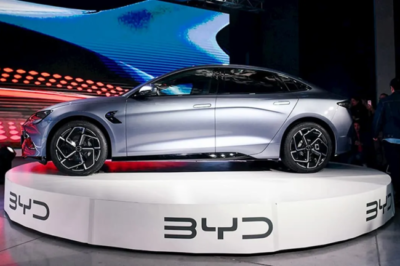
- Chinese EV giant BYD is setting up its first Indian factory in Telangana to navigate global trade barriers.
- The move comes as the U.S. and EU impose heavy tariffs on Chinese EVs, making exports less viable.
- BYD’s entry could shake up India’s EV market, challenging local players and Tesla’s upcoming launch.
Why is BYD expanding into India now?
BYD, the world’s top electric vehicle manufacturer, is making a bold move by establishing a plant in India’s Rangareddy district, Telangana. This comes as the U.S. and EU tighten restrictions on Chinese EV imports, with tariffs as high as 100% in the U.S. and up to 35.3% in Europe. With these barriers limiting its global reach, BYD is shifting focus to India—a rapidly growing EV market with government incentives and rising consumer demand.
Partnering with Hyderabad-based Megha Engineering and Infrastructures Ltd (MEIL), BYD aims to produce locally to bypass import duties and strengthen its position in India. The company, which surpassed Tesla in global sales in 2024, has already set up manufacturing plants in Thailand, Brazil, and Hungary, and now sees India as a key expansion hub.
What makes BYD’s technology stand out?
A major advantage for BYD is its proprietary Blade Battery technology, which uses lithium iron phosphate (LFP) instead of traditional lithium-ion batteries. This innovation offers:
- Better safety – It remains stable under extreme conditions and reduces fire risks.
- Higher energy efficiency – Improves space utilization by over 50%, allowing for larger battery packs.
- Faster charging – With BYD’s Super e-Platform, a 470-kilometre range can be achieved in just five minutes, outpacing Tesla’s 15-minute charge for a similar range.
With India’s EV market projected to reach 932,000 units by 2030, BYD’s entry could push domestic players like Tata Motors, MG Motor India, and Mahindra Electric to step up their game.
Can BYD dominate India’s EV market?
While BYD has a strong presence in China, its success in India depends on factors like pricing, government approvals, and charging infrastructure development. Tata Motors currently leads the Indian EV market with a 38% share, followed by MG Motor (29%) and Mahindra Electric (16%). However, competition is set to heat up as Tesla also eyes India for expansion.
With Tesla’s market share in China dropping from 16% in 2022 to just 4.3% in 2025 due to BYD’s aggressive expansion, the real battle for EV dominance in India is just beginning. Can BYD replicate its success here, or will homegrown players and Tesla pose a challenge? The next few years will reveal the answer.









































Leave a Reply